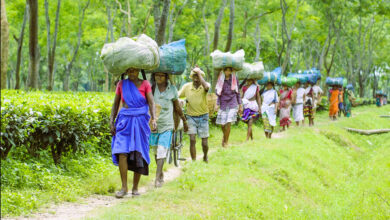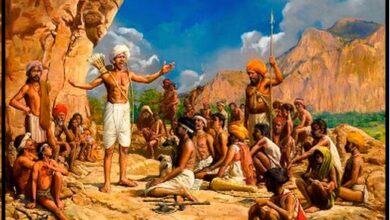The advantages of using the Term ADIVASI
The commission and committee set by the government of India – namely, the Dhebar Commission, 1960-61), Lakar Committee, A.K. Chanda Committee 1966 to study the issue of granting ST status to the tea garden labourers, use the ex-pression ‘tribes’ (meaning ADIVASIs in Hindi) and no mention is made of ‘tea tribe’ at all. ( M. Hussain, The Assam Movement: Class, Ideology and Identity, Manak Publications Pvt. Ltd., Delhi, 1993, 181-196.)
The name ADIVASI – is constitutional term, it well know and accept in the national media, social scientists and re-search scholars.
– It unites with other tribal groups of India whereas ‘tea tribe’ only divides and alienates this national unity.
– The name ‘tea tribe’ is a recent origin (may be not more than 25 years) whereas the term ADIVASI and equivalents in English like tribes, tribals etc goes to the time of British rule.
– The name ‘tea tribe’ – illogical, derogative, an ethnic groups social worth is not recognized.
– The birth of number of organizations with the name ADIVASI (like AASAA, AAWAA, ACA, ASS, ADIVASI Sahitya Sabha) all over Assam speaks its popularity and on the other hand, clearly indicates the revolt against the name ‘tea tribe’.
Famous journalists and social scientists not only use the term ADIVASI but they are also in favour of granting ST status to them.
“If ST status is about whether a group deserves reservations in jobs and in educational institutions, the case for ADIVASIs being recognized as STs is indisputable.” He further states with strongest possible emphasis, “whether migrants should be considered ST or not, given the contribution of the tea labour community in blood and in sweat to the formation of modern Assam, no other group has a better claim to full citizenship rights and compensatory justice than they do.” (Sanjib Baruah, ADIVASI Politcs in Assam, telegraphindia.com, December 10, 2007.) Sanjib Baruah is from Centre for Policy Research, New Delhi and the Indian Institute of Technology, Guwahati)
“But, for the ADIVASIs, demanding ST status is not unreasonable… Keeping in mind the precarious living conditions of ADIVASIs, both the governments of home and resident states need to consider it seriously while not neglecting the interest of the indigenous tribes of the resident state.” (Moirangthem Prakash, The ADIVASI Question in Assam, Telhelka.com, December 14, 2007) Moirangthem Prakash, a researcher at the Indian Social Institute, New Delhi.
“… it is a fact that the ADIVASIs are socially and educationally backward compared to many other tribes. Now the time has come for the Centre to take a firm decision on the matter and settle it convincingly once and for all. No one would object to the granting of ST status to ADIVASIs if they fulfill the required criteria.” (Pradeep Kumar Dutta, ADIVASIs and ST Status, Assam Tribune, Editorial, December 2, 2007).
Under the name Tea Tribe it is just not possible to get ST status for anyone
“They [ADIVASIs] have been demanding Scheduled Tribe status for a long time. But the Government of Assam, by sending their application as a tea tribe, ensures that they will not get such status: After all, they are ADIVASIs, Mundas, Santhals and others who are recognized as tribes in their original homeland. So why not extend that recognition to other parts of the country, such as Assam, where they now live and have lived for over a century.” (Sanjay Hazarika, the Veteran journalist and Northeast observer stated this in Guwahati Clash could start another Tragic Conflict, on IBNLive chatroom – http://ibnlive.in.com/news/delhi-pays-attention-to-ne-only-when-forced-to/53135-3.html- on November 27, 2007)
Yet in another place Sanjay Hazarika says very clearly says that there is no such thing as ‘tea tribe’. “The Assam government’s position has been to send it straight to Government of India saying the tea tribe should be scheduled as tea tribe. There is no such thing as a tea tribe. There are many communities within the tea-growing community that migrated here in 19th century,” said Northeast expert Sanjay Hazarika. (Deborshi Chaki, Storm in Assam’s Tea Cup: Story behind the unrest, CNN-IBN (http://ibnlive.in.com/news/storm-in-assams-tea-cup-story-behind-the-unrest/53146-3.html) Nov. 28, 2007)
“Yet the demand of the tea workers’ descendants for ST status, and the framework within which the debate is being conducted, drew attention to our continued reliance on a highly questionable stock of colonial knowledge about Indian society and culture. This should be a source of embarrassment, as well as cause for serious introspection.” (Sanjib Baruah, ADIVASI
Politics in Assam, telegraphindia.com, December 10, 2007) Sanjib Baruah is from Centre for Policy Research, New Delhi and the Indian Institute of Technology, Guwahati).
Vested interest in trying to retain the name ‘tea tribe’
It is important for media, the social scientists, the thinkers as well as the common tea garden workers to understand why a group of vested interest want to retain and perpetuate this derogative name.
Those against the ST of ADIVASIs
– This group opposes the name ‘ADIVASI Development Council’.
– The groups opposes the idea of ‘Sarba-siksha’ in ADIVASIya (Sadri) .
– These groups opposed the idea of ‘ADIVASIya News in ND TV.
Drastic Wrong in the name ‘tea tribe’ and in the intention of all those who wants to perpetuate it.
The organizations at national and international level like ICITP (Indian Confederation of Indigenous and Tribal Population, UNPMII (United Nations Permanent Mission on Indigenous Issues) etc are more and more getting involved in the process of working for the preservation and promotion of the languages, cultures and heritages of the indigenous groups of the world. While those who want to maintain the name ‘tea tribe’ are involved in a contrary process of destroying the beautiful and distinct linguistic and cultural identity of the tribes and castes of the tea industry. Even if the present demand for identity recognition of the ADIVASIs is side-tracked or high-jacked due to political high-handedness very soon due to the force of democratic consciousness this demand will find its ex-pressions in social, political and industrial arenas in a healthy or unhealthy way, in a constructive or destructive way. The greater the political and democratic consciousness the greater will be the demand. Here is what is needed the wisdom on the part of decision makers to understand the undercurrents of the crucial tea industry and take necessary remedies.
Critical questions after the para of opinions of thinkers on Tea tribe and ADIVASI
It was the government of India which de-scheduled the ADIVASIs during the ministry of Tarun Ram Phukan. Why did the government of Assam not consider to give constitutional recognize to each of the tribes and castes of tea industry as they are in the state of origin? In stead it branded them with the derogative nomenclature ‘tea tribe’. It has become more than clear now, that under the name ‘tea tribe’ it is impossible to get Scheduled Status. Isn’t the harsh truth that the government of Assam has been using one mechanism after another in depriving the ADIVASIs from their constitutional rights?
Industrial Peace is must for increase of productivity
The tea industry of Assam has been enjoying reasonable industrial peace. However, from this industrial peace the workers have not gained anything much in matters related to their rights as workers, which in turn will affect the productivity of the industry in the long run.
Emphasizing on the need to improve the conditions of the labourers, the 1975 seminar titled Problems of Tea Industry in North East India, states, “The Seminar noted with concern that the tea plantation labourers had not been provided with the requisite housing, medical and other facilities under Plantation Labour Act 1951. It suggested the need of closer co-ordination between the management and trade unions so that the workers could be ensured of their due share of industry’s prosperity. Though there is an organized trade union movement in the region, yet it cannot be said that labour has gained out of the industrial peace that has been reigning in the tea plantation industry for a long time.”[1]
G.P.Baruva, tea planter, Sibsagar, Assam, writes, “…Because of this labour intensiveness, labour-management relations here play a vital role in increasing the efficiency and the productivity of workers and thereby the welfare of the country as a whole. …It is through good labour management relations that productivity could be increased and gains could be equitably shared.”[2]
Prasanneswari states that there is an increasing gap between management and labour. The management of the tea industry, as a private enterprise, will aim at maximum profits and minimization of costs, in the pursuit of which the workers’ interests get aback-seat. In these circumstances, the trade unions and the government could effectively intervene in the protection of the legitimate right of the workers, thereby minimizing the areas of conflicts and gap. If the government is to play an effective role in protecting the workers and the industry, it should pass laws carrying more stringent penalties and effectively enforce their implementation.[3]
However, at the present juncture of history of tea industry the tea garden labourers are not only interested in their rights as workers but much more their political and constitutional rights. Unless government makes necessary structures so that they enjoy these rights the industrial peace is bound to shatter and affect the productivity negatively and thereby the economic growth of the state. Those who are opposing the creation of ADIVASI Development Council and the scheduling of the ADIVASIs are also responsible for shattering the industrial peace.
Feeling of Alienation of ADIVASIs of Assam
‘The sheer exploitation of Assam’s primary products, tea and oil, without a nominal return for the indigenous people and labour, lakhs and lakhs of whom were brought from Chota Nagpur, Orissa and further south, is hardly remembered with indignation’ writes S. Gurudev, the sub-editor of Hindustan Standard (Delhi edition).[4] In Eclipse in the East, Assam Sahitya Sabha expresses its pain and fear, “Over the years, since Independence, Assam has been treated as nothing better than a colony within the republic for exploitation by the rest of the country and by foreigners. …Every year we get Rs. 22 crores as royalty for Rs. 840 crores worth of oil….The tea industry, here, which produces 270 million kgs. of tea worth over Rs. 400 crores every year, is controlled from Calcutta and London….”[5] M. Hussain, a renowned sociologist of northeast India, establishes close relationship between the underdevelopment of the economy of Assam and the Assam movement.[6] N. A. Gokhale, one of the renowned journalists of Northeast India, traces back in history the feeling of resentment, insularity and alienation by the locals towards the tea industry.[7] If the feeling of alienation of those who do not directly work in the tea industry is such strong then how strong will be the feeling of alienation, of deprivation, of marginalization, of oppression of the ADIVASIs/tea garden labourers of Assam, who have been contributing towards the tea industry, the economy of the state and the foreign exchange through their sweat and blood generations after generations? How great is the feeling of alienation of ADIVASIs when they are not even given the need-based wages and amenities while the tea industry mints money, the planters, the owners and the share holders enjoy luxury and plenty, the government gets in crores by way of tax and foreign exchange? How great is the feeling of alienation of the ADIVASIs when for more than 40 years have been deprived of their constitutional rights?
References:-
[2] G, P. Baruva, “Labour-Management Relations in Tea Industry,” Problems of Tea Industry in North East India: Papers of a Seminar Organized by North East India Council for Social Science Research, Shillong, Resarch India Publications, Calcutta, 1981, 71, 72.
[3] Prasanneswari, “Industrial Relation in Tea Plantations,” Economic and Political Weekly, June 16-23, XIX(1984)24-25, 956-960.
[4] S. Gurudev, Anatomy of Revolt: In the North East India, Lancers Books, New Delhi, 1996, ix.
[5] S. Gupta, Assam: A Valley Divided, Vikas Publishing House Pvt. Ltd., 1984, 63.
[6] M. Hussain, The Assam Movement: Class, Ideology and Identity, Manak Publications Pvt. Ltd. in association with Har-Anand Publications, Delhi, 1993, ix.
[7] N. A. Gokhale, The Hot Brew: The Assam Tea Industry’s most Turbulent Decade (1987-1997), Spectrum Publications, Guwahati : Delhi, 3, 45. Gokhale writes, “For a century the tea industry reminded aloof and alien to the locals. Seen, but not herd. Part of Assam’s landscape and yet distant from its people. This perception gave rise to a century old grouse. The resentment against the sahibs and later the ‘brown sahibs’ was bound to explode one day. And it did in the late 1980s. to understand what took place in the decade between 1987 and now, it is however essential to go back to the roots the tea story really begins in the mid-nineteenth century.”




TOP CASINO
GIVING AWAY EASY SPINS TO ALL FRESH PLAYERS!
Bent to win? Come and try your success rate at our licensed casino. Gifts pro all young players!
Undistorted bonuses for powerful players!
Tournaments – take on with chips and persuade existent readies!
Cancel your winnings without verification.
LEAGUE WITH AND WIN-> https://goo.su/fMeVC